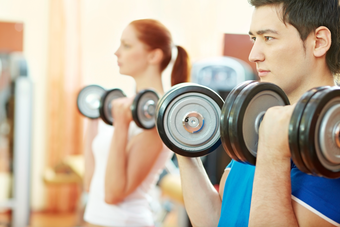Probiotics May Reduce Inflammation, Performance Degradation Following Exercise: SupplySide West Report

October 14, 2016
By Michael Crane
Probiotics firms have long had their eyes on the sports nutrition market, but new research results shared by Pharmachem Laboratories (Kearny, NJ) suggest a blend of two probiotic strains may be particularly effective at reducing inflammation and mitigating performance degradation following strenuous exercise.
At the SupplySide West trade show, Ralf Jäger, PhD, cofounder of consulting firm Increnovo LLC (Milwaukee, WI), shared results of a new double-blind, randomized, placebo-controlled crossover trial that investigated the anti-inflammatory effects of two probiotic strains developed by Probiotical S.p.A. (Novara, Italay) and distributed in the United States by Pharmachem.
For 21 days, 16 healthy, resistance-trained men aged 21–29 were randomized to consume either a placebo or a probiotic blend containing 5 billion live cells of Bifidobacterium breve BR03 and 5 billion live cells of Streptococcus thermophilus FP4 once per day. The probiotic blend was micro-encapsulated with Probiotical’s patented Microbac coating, designed to enhance colonization and protect the probiotic cells from damage.
At the end of the supplementation period, all study participants underwent a muscle-damaging bout of strenuous exercise involving elbow flexors. Researchers measured elbow flexor performance and the inflammation marker interleukin-6 (IL-6) prior to the strenuous exercise, after the exercise, and following subsequent bouts of exercise. A 21-day washout period separated the two protocols, after which all subjects switched to the alternate protocol.
As soon as 30 minutes after the exercise, researchers observed anti-inflammatory benefits in the probiotic group, with an even more pronounced reduction of inflammation observed at 24 hours after exercise. What’s more, in subsequent muscle-damaging exercises, the probiotic group experienced “attenuated performance decrement” compared to the placebo, Jäger reported, as measured by relative decreases to the isometric peak torque. Probiotic supplementation was also found to improve range-of-motion compared to the placebo.
In his SupplySide West briefing, Jäger noted that little was previously known about how probiotics affect inflammation and performance in athletes after strenuous exercise. He added that this study may suggest the potential for the “first ergogenic probiotics.”
As to future areas of study, Jäger told Nutritional Outlook he would be interested in investigating the effects this probiotic blend may have on joint health, as well as a model of chronic exercise performance, rather than acute exercise performance, as was studied in this trial.
http://www.nutritionaloutlook.com/sports-energy/probiotics-may-reduce-inflammation-performance-degradation-following-exercise-supplyside-west-report
By Michael Crane
Probiotics firms have long had their eyes on the sports nutrition market, but new research results shared by Pharmachem Laboratories (Kearny, NJ) suggest a blend of two probiotic strains may be particularly effective at reducing inflammation and mitigating performance degradation following strenuous exercise.
At the SupplySide West trade show, Ralf Jäger, PhD, cofounder of consulting firm Increnovo LLC (Milwaukee, WI), shared results of a new double-blind, randomized, placebo-controlled crossover trial that investigated the anti-inflammatory effects of two probiotic strains developed by Probiotical S.p.A. (Novara, Italay) and distributed in the United States by Pharmachem.
For 21 days, 16 healthy, resistance-trained men aged 21–29 were randomized to consume either a placebo or a probiotic blend containing 5 billion live cells of Bifidobacterium breve BR03 and 5 billion live cells of Streptococcus thermophilus FP4 once per day. The probiotic blend was micro-encapsulated with Probiotical’s patented Microbac coating, designed to enhance colonization and protect the probiotic cells from damage.
At the end of the supplementation period, all study participants underwent a muscle-damaging bout of strenuous exercise involving elbow flexors. Researchers measured elbow flexor performance and the inflammation marker interleukin-6 (IL-6) prior to the strenuous exercise, after the exercise, and following subsequent bouts of exercise. A 21-day washout period separated the two protocols, after which all subjects switched to the alternate protocol.
As soon as 30 minutes after the exercise, researchers observed anti-inflammatory benefits in the probiotic group, with an even more pronounced reduction of inflammation observed at 24 hours after exercise. What’s more, in subsequent muscle-damaging exercises, the probiotic group experienced “attenuated performance decrement” compared to the placebo, Jäger reported, as measured by relative decreases to the isometric peak torque. Probiotic supplementation was also found to improve range-of-motion compared to the placebo.
In his SupplySide West briefing, Jäger noted that little was previously known about how probiotics affect inflammation and performance in athletes after strenuous exercise. He added that this study may suggest the potential for the “first ergogenic probiotics.”
As to future areas of study, Jäger told Nutritional Outlook he would be interested in investigating the effects this probiotic blend may have on joint health, as well as a model of chronic exercise performance, rather than acute exercise performance, as was studied in this trial.
http://www.nutritionaloutlook.com/sports-energy/probiotics-may-reduce-inflammation-performance-degradation-following-exercise-supplyside-west-report

